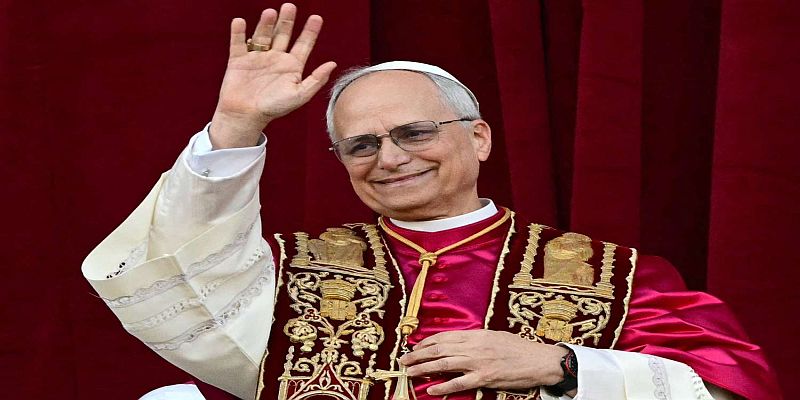Pope Leo XIV: Will He Treat Africans as an Afterthought?

The panorama from Saint Peter's Square on the day of the new Pope's announcement offered a familiar tableau: a sea of faces, predominantly white. Yet, this image belies a profound demographic reality within the Catholic Church.
While the church in the West grapples with aging congregations and declining numbers, Catholicism is experiencing a vibrant and exponential growth in Africa. This stark contrast raises a crucial question: Will the new pontiff truly embrace the burgeoning African church in rhetoric and tangible ways that dismantle the subtle yet persistent marginalization it faces?
The sparse presence of African faithful in Rome for this momentous occasion speaks volumes. It is difficult to ignore the potential barriers of visa restrictions, fueled by unwarranted suspicion towards African travelers, and the simple economic reality that many in the young, vibrant, yet often materially poor African church cannot afford such journeys. This absence, however, should not equate to absence in the consciousness of the universal church.
Too often, Africans, both within and outside the Catholic fold, are treated as an afterthought, their experiences and perspectives relegated to the periphery. My experience last Sunday, where a family visibly avoided sitting near us in church, served as a painful reminder of this subtle othering, a stark contradiction to the essence of the "common bread we shall break."
This marginalization extends to the very narratives surrounding the church. News coverage from the Square, as my notes indicate, primarily focused on white Caucasian voices, with scant attention paid to the perspectives of African Catholics. Yet, back home, the faithful were deeply invested in the conclave.
WhatsApp groups buzzed with novenas, and the white smoke signaling the papal election was met with fervent prayers, celebratory messages, and the eager sharing of news. The subsequent circulation of images showcasing the new Pope's past visits to Kenya – his engagement with the Augustinian community in Karen and the residents of Baba Ndogo, his prior trips in 2004 and 2011 – underscored a pre-existing familiarity with the African context.
His initial pronouncements at the church in Karen, Nairobi, offered a glimmer of hope. His echoing of the Responsorial Psalm – "Your words, O Lord, are spirit and life" – and his call to open hearts to the joy of the day resonated with a universal message of faith anchored in Christ, the cornerstone of true life. His emphasis on the church as a community built on the rock of faith, with open doors welcoming all, and his recognition of diversity as the church's richness, are particularly pertinent to the African church, which has long operated from the periphery.
As an Augustinian who has ministered in Peru, the new Pope understands the dynamics between the center and the periphery, the exploitation of resources, and the struggles for justice. His initial call for peace and his concern for workers and farmers suggest an awareness of the conflicts and inequalities that disproportionately affect the global south, including Africa.
He arrives at a pivotal moment, as the periphery increasingly asserts itself on the world stage. He hopes to engage deeply with the African church, addressing the root causes of marginalization, poverty, and conflict, and recognizing the vibrant faith exemplified by the growth of initiatives like the Swahili Mass. It will amplify the practical application of the African communitarian spirit methods, traditions, and philosophies in addressing challenges and enabling the Kenyan Catholics to live a Catholic moral life. It will also demonstrate the links the African church at the periphery has with the rest of the Catholic Church in the center. This will be done in the practical application of Augustinian virtue ethics and the future dynamics of virtue ethics expressed in the African Communitarian Spirit, traditions, philosophies, institutions, and strategies, thereby underlining the forward-looking nature of evangelization.
Saint Augustine views virtue ethics as gifts from God that enable humans to live lives that are pleasing to God. He proposed four cardinal virtues: prudence, justice, temperance, and fortitude. He added three theological virtues: faith, hope, charity, and love. He saw virtues as a means to achieve union with God. Other virtues include humility, compassion, and kindness. According to Saint Augustine, virtues should aim to attain moral excellence, spiritual growth, and life purpose. These virtues are relevant to African problems of corruption, bad governance, conflict, and human rights abuse.
However, there is a crucial need to move beyond simply analyzing the problems of the marginalized through foreign lenses. We must rethink the narrative of what constitutes a "good life" for those on the margins, acknowledging their inherent humanity and the richness of their lived experiences – their love, families, faith, and resilience. The focus should be on the role of the African communitarian spirit and its potential to strengthen faith, foster well-being, and build vibrant Catholic communities. The focus should be on faith, justice, sharing, hope, charity, community, and love in guiding African Christian lives and pursuing the common good.
The election of a Pope with prior experience in Africa offers a unique opportunity. Will he be captured by the traditional power structures of the center, or will he truly champion the voices and experiences of the periphery? Will he move beyond acknowledging Africa's growth to actively dismantle the physical and systemic barriers that prevent its full participation in the universal church? The African church, vibrant and growing, stands ready. The world watches to see if this new papacy will usher in an era of genuine inclusivity, where the richness and dynamism of faith from all corners of the globe are not just recognized, but truly embraced.
By Mary Njeri Kinyanjui
Founder, Beyond Knowledge Horizons and Independent Scholar
marykinyanjui@yahoo.com
